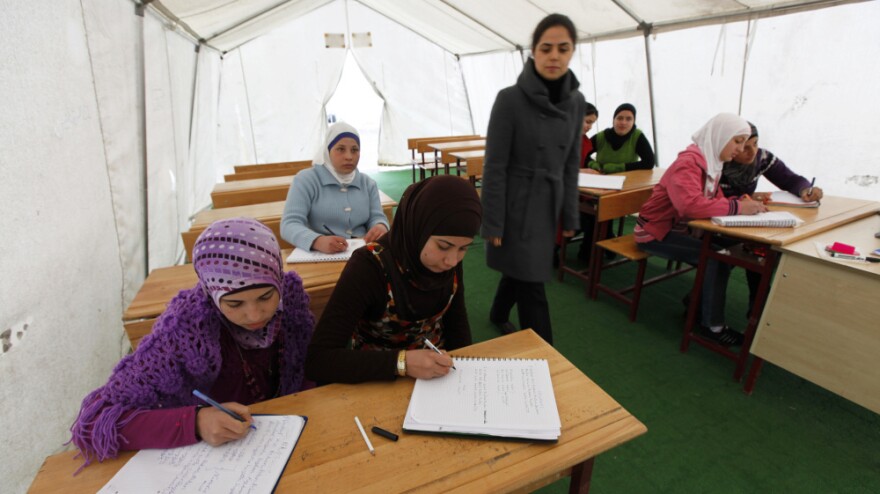It could be a scene from almost any school in the world: rows of young kids reciting their lessons, the girls dressed in shades of pink and sporting Hello Kitty backpacks, the boys in dark clothing, looking a little restless.
But this makeshift school is in a concrete farmhouse on the outskirts of Antakya, in southern Turkey's Hatay province near the border with Syria. And the 156 students — aged 6 to 13 — are all refugees from cities and towns across Syria.
The school has been in this house only for two weeks. Before that, students attended classes in a public park because the Turkish government kicked them out of a previous building.
Mustafa Shakir is a school administrator and imam from the Syrian city of Latakia. He's cofounder of this school, which started out four months ago with 15 students in his apartment in Antakya.

"When we started thinking about the school, we felt that our kids shouldn't be out in the streets or watching the news," Shakir says. "And we feel this is part of the revolution, our duty now is to make schools and educate the children."
Shakir says that Syrian President Bashar Assad is trying to break his country's people, and educating the children will make the revolution stronger.
Expanding Services For Refugees
Nearly 12,000 Syrians are living in camps in Hatay province, with several thousand more outside the camps. The school in Antakya city, for example, serves the nearly 250 Syrian families living there. Syrians are getting other services, too, including health care, and are setting up more schools and clinics of their own.
But all of this has led their Turkish hosts to start questioning how long they want their guests around.
Wael Kurdy, a 24-year-old Syrian who arrived in Turkey last year, is one of a small group of young doctors and medical students looking after wounded Syrians. During the day, he visits Syrian patients in Turkish hospitals. Kurdy often spends evenings in a cafe across the street from the city's public hospital.
We've done all this to help them in any way we can, but it's like they expect it. ... My hope is that things go back to some sense of normalcy in Syria and they can go back, and it will be better for Turkey and our economy.
On a recent night, the young doctor flips through a stack of receipts and patient records. He says few of the Syrians are getting appropriate medical care.
His phone rings. It's a Syrian woman who says her medication has run out and wants his help getting more.
"We decided to make a public clinic for the refugees outside the camps. This came from our own experience here," says Kurdy, who fled Syria last July after being arrested for protesting the Assad regime. "My mother was sick and I didn't know where to take her."
The small clinic is located in a bottom-floor apartment in a residential neighborhood where cats and chickens roam the dirt streets.
Abu Baha, one of the doctors there, says there are many Syrian patients in the hospitals, but the clinic has only six beds. "We intend to rent a bigger building," he says.
Turks' Frustration Growing
Some Turks in Hatay province are starting to lose patience with the refugees. While many say they don't mind or even notice the Syrians, a recent feature in a local paper quoted business owners who said they are fed up. They are losing money because unrest on the border has dampened tourism in the province. And some locals are starting to feel they are being taken advantage of by the refugees.
Yasar Altunay runs a small grocery a few blocks from the clinic.
"We've done all this to help them in any way we can, but it's like they expect it," he says.
He says he and other locals have cosigned leases, provided phone and Internet service to the refugees, and given them food. He has rented out his properties to a number of Syrian activists.
"They can take a house and turn it into a barn in the matter of a month," he says. "My hope is that things go back to some sense of normalcy in Syria and they can go back, and it will be better for Turkey and our economy."
But it doesn't look like that's going to happen anytime soon. For now, the kids at the makeshift school seem perfectly happy just being kids, running around the little playground. And the teachers hope the Turkish government will let them keep the school running as long as needed.
Copyright 2020 NPR. To see more, visit https://www.npr.org.



